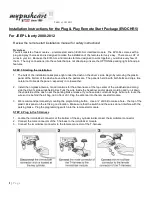
4. The resulting figure equals the available amount of
cargo and luggage load capacity. For example, if
the “XXX” amount equals 1400 lbs and there will be
five 150 lb passengers in your vehicle, the amount
of available cargo and luggage load capacity is
650 lbs (1400
−
750 (5 x 150) = 650 lbs).
5. Determine the combined weight of luggage and
cargo being loaded on the vehicle. That weight
may not safely exceed the available cargo
and luggage load capacity calculated in Step 4.
6. If your vehicle will be towing a trailer, the load
from your trailer will be transferred to your
vehicle. Consult this manual to determine how
this reduces the available cargo and luggage load
capacity of your vehicle.
If your vehicle can tow a trailer, see
on page 4-40 for important information on towing a
trailer, towing safety rules, and trailering tips.
Item
Description
Total
A
Vehicle Capacity
Weight for Example 1 =
1,000 lbs (453 kg)
B
Subtract
Occupant Weight
150 lbs (68 kg)
×
2
=
300 lbs (136 kg)
C
Available Occupant
and Cargo Weight =
700 lbs (317 kg)
Example 1
4-35
Summary of Contents for CTC 2005
Page 5: ...These are some examples of symbols that may be found on the vehicle v...
Page 6: ...NOTES vi...
Page 126: ...NOTES 2 56...
Page 129: ...NOTES 3 3...
Page 130: ...Instrument Panel Overview CTS shown CTS V similar 3 4...
Page 162: ...CTS V United States version shown Canada similar 3 36...
Page 234: ...NOTES 3 108...
Page 294: ...When you open the hood on the 5 7L V8 CTS V you will see the following 5 14...
Page 382: ...Rear Pass Through Seat Split Folding Rear Seat 5 102...
Page 390: ...NOTES 5 110...
Page 422: ...NOTES 7 14...
















































